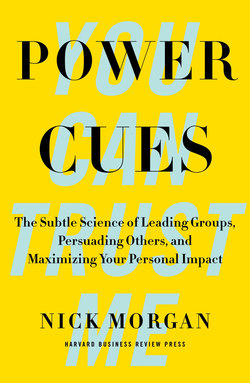Читать книгу Power Cues - Nick Morgan - Страница 13
На сайте Литреса книга снята с продажи.
What Humans Really Want
ОглавлениеAt the heart of this book is a surprising truth, one that defies most of the previous thinking about body language. People have studied it as a way of reading others, gesture by gesture and, indeed, sometimes as a way of consciously sending secret messages to others—messages of control or sexual interest, perhaps. Most of those early attempts to understand body language are silly and primitive.12
Here’s what is really going on. We humans are much more communal than we realize. It’s something we’ve forgotten, as we tune in separately to our thousand channels of entertainment and news using devices that isolate us even as they offer pseudo-connections to the group through music or headlines or games. We only remember our communality when we get together as a group to hear a speech, attend a concert, or root for a sports franchise.
But when we get together in groups, we become a tribe again, and we instinctively want to have a leader. That’s your chance to take control, consciously using the power of everyone’s unconscious mind.
That’s why an audience is so eager for a speaker to succeed, for example, and so disappointed when one fails. There’s an opportunity that is squandered a thousand times a day in a thousand meeting rooms around the world. Instead of focusing on the group, the emotion, and the need for leadership, speakers think about PowerPoint and content. What a huge amount of wasted effort!
We create a leader to make us feel safe and to give us a group purpose or direction. Because, like a group of fish or birds or zebra, we need and want guidance. As you’ll see, the unconscious signals that the speaker sends out to the audience must create trust and credibility or else the audience gives up, disappointed, and looks elsewhere for another leader.
These group activities satisfy deep cravings that developed during our early evolution in the cave. In our prelinguistic, less individualistic childhood as a species, we depended on one another for survival, and leadership was both essential and instinctive.13
When we lived in caves, we humans were a relatively frail, weak species, below some formidable foes in the food chain—woolly mammoths, saber-toothed tigers, and the rest of the menagerie. So we learned to respond instantly to one another in order to stay alive. We could read each other’s emotions, and we could tell who was in charge, without a word being spoken.
Today, most of the dangers to which we were ready to respond then have gone away. But our cravings for leadership and connection remain. Where once we needed to react instantly to physical danger, now most of us face long-term tensions associated with jobs, relationships, and communities. Where once we needed to be ready to act quickly as a tribe to stand united against dangers, now our individual opinions matter more than our tribal loyalties. Where once we found comfort in group rituals around a dim, smoky fire in a cave, now many of us put on ear buds to connect emotionally with our fellow humans through recorded music. Indeed, recent research shows that we respond to new music much as we do to sex and drugs.14 When the baby boomers talked about sex, drugs, and rock and roll, they were on to something.
With what you’re learning from the brain scientists, you can begin immediately to make your own communications more effective and powerful by tapping into that ancient craving for connection. You can learn how to overcome shyness, how to increase your charisma a hundredfold, how to control a room, how to get your teenager under control, even how to cure yourself of recurring thoughts, habits, and dreams.
It’s not just brain research. I have lots of practical experience in these techniques through work with clients over the past two decades. For example, I trained one woman, who had always been put down by men in her professional life, to change their perception of her and take charge of her career—without saying a word.
I worked with another person whose shyness was damaging his career and his marriage. He learned to become a more effective communicator at work and at home—and became a CFO.
I helped another client double his speaking fees by making a few small changes in the way he stood in front of an audience.
You’ll learn that what the brain research shows actually happens when people communicate, and how you can use that understanding to become a new kind of persuasive, charismatic leader yourself. You can achieve the same kind of transformation that I have seen over and over again in my work with clients over the past two decades.
